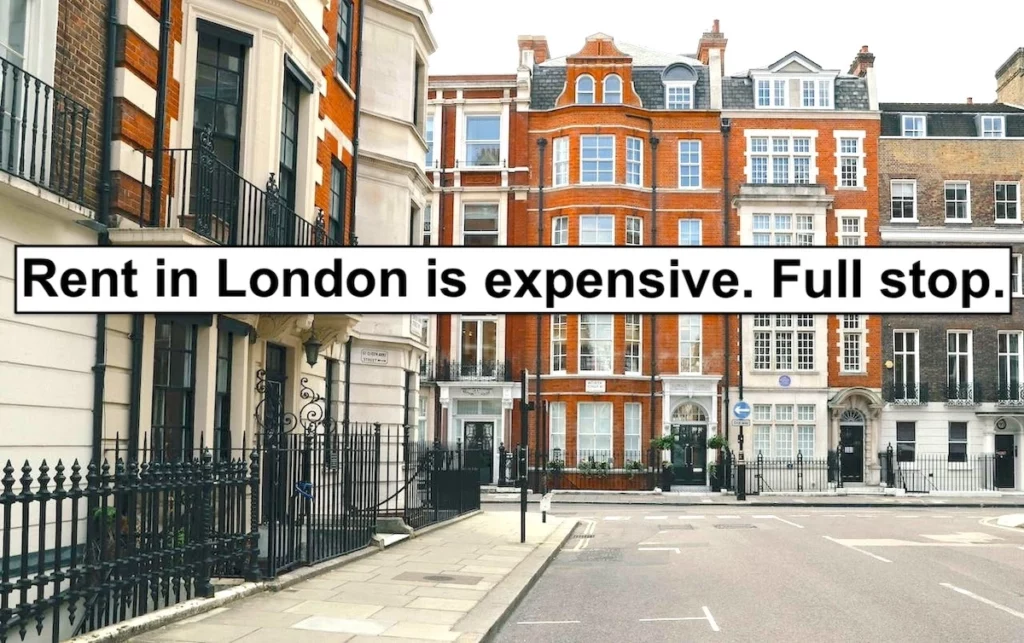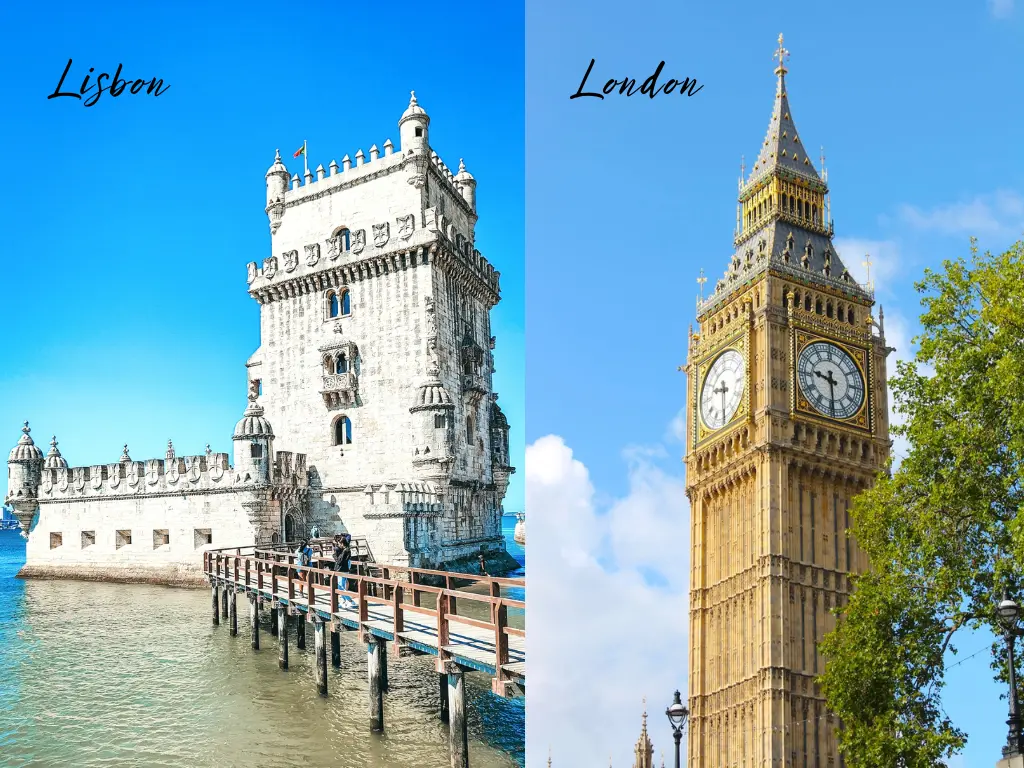We are delighted to welcome our guest contributor, Rafael (aka Shield Investor) who will be sharing his experience moving from Lisbon to London.
In recent years, Portugal has become an increasingly popular destination for relocation. The Internet has no shortage of useful information on moving from the UK to Portugal, but seldom have I come across articles that cover the other way around. So, this is what I will be sharing today: my personal experience relocating from Lisbon, Portugal to London, UK.
- Why I Relocated from Lisbon to London
- Cost of Rent in London vs Lisbon
- Cost of Utilities in London vs Lisbon
- Cost of Groceries and Dining Out in London vs Lisbon
- Cost of Transport in London vs Lisbon
- Investing and Growing Wealth in the UK vs Portugal
1. Why I Relocated from Lisbon to London
Let me start by giving a bit of context about myself and the reasons behind my relocation. I was born and bred in Lisbon. If you have not visited Lisbon before, I have a feeling you will love it (I know, I’m biased here). The mild climate, the proximity to the sea, the food and the relatively low cost of living compared to other European capitals make the city an attractive choice for many.
So, if Lisbon is such a great deal, why relocate to London?
Well, a few years before moving to the UK, my partner and I became interested in the world of personal finance and investing. From reading about the concept of FIRE (Financial Independence Retire Early) to listening to every major investing podcast, you name it, we have been through it.
One thing we have learnt from investing is that having a long-term perspective when it comes to building wealth is important. This involves delayed gratification and investing in income-producing assets that appreciate over time.
With this new mindset, we realized that the quicker we can build a well-diversified investment portfolio, the quicker we can build momentum to achieve financial independence, which in turn gives us more flexibility and freedom to decide what to do with our own time. That was our ‘aha’ moment.
We have lived all our lives thinking that we need to work from our twenties up until retirement age in our sixties and be left with just a dozen more years to enjoy our retirement life. That we should mainly aim to buy a house first, then to get married and have kids. You probably know the drill.
But that’s not what I want. Neither does my partner. We have a vision to design a life plan to become financially free earlier. Setting goals and trying to achieve them keeps us in motion towards our idea of success and freedom.
In the process of developing our financial plan, we realized that we had two options. Either we could reduce our expenses or increase our income. Both would improve our monthly investment ratio, meaning the percentage of money we could regularly use to invest in our future.
We started by reducing expenses. We were able to identity some expenses – after long budgeting and planning – as reducible ones. However, we knew we would not go cheap (or extremely frugal) to the point that we would jeopardize living our best lives today to accelerate a few years of independence in the future. The whole point is always to keep a balance between living well in the present and guaranteeing freedom of choice in the future, right?
So, we started thinking about increasing our household income. The time coincided with an offer to work in London and after going through several budget simulations of the potential costs, we gave it a go.
London is not cheap and most things are more expensive than what we were used to paying for in Lisbon. But with a substantial increase in our income base, our investment ratio has also increased and therefore, we could target to reach our financial goals earlier in life than if we had stayed in Portugal.
We did thorough planning and cost estimation before the big move. However, planning is different from reality and even with a few buffers in place, there were some surprises when we finally moved. So, here’s London’s high cost of living in 3, 2, 1…

2. Cost of Rent in London vs Lisbon
This is the largest part of our budget. Rent in London is expensive. Full stop. If you need to commute to London’s city center, you will not find it very comfortable to take more than one hour driving or using public transport to go and return from the office every day.
Hence, you are likely to find yourself quickly looking for a house anywhere between zones 1 and 3, where access to the city is easier. We had initially budgeted for anything between £1,700 and £2,000 per month, but most places in the area with the set of characteristics that we were looking for were asking for £2,100 to £2,500, so we settled in the middle.
The same house layout in Lisbon, despite the rising prices in the last few years, would cost you roughly half the price.

3. Cost of Utilities in London vs Lisbon
Energy, gas and water, plus council tax (your local city tax priced according to the area you live in) are also more expensive than what we were used to.
In Lisbon, few are the days when you need to turn your heating on – the weather is usually mild during the winter and most houses don’t even have A/C or an integrated heating system.
Since the UK has a (much) colder weather than Portugal, accounting for heating is a must during the colder months. If we were used to paying ~£90 per month in Lisbon during the colder months, in the UK the bill can go closer to the £200-£300 bracket. The water bill is no different. If we paid ~£15 back home per month, in London we pay no less than double. Council tax varies but counts in another £80-£100 monthly depending on where your house is located.
4. Cost of Groceries and Dining Out in London vs Lisbon
Overall, we have not felt a big difference in our monthly grocery bill. The UK has a lot of locally produced products, which can be used to fight back some of the challenges that have been raised by Brexit and the departure from the EU space. Meat and fish are the two things that are clearly more expensive in the UK.
The biggest difference we found is in the cost of dining out (food and drinks). Take coffee and beer for example. A regular latte or cappuccino costs no less than ~£3.50. Finding a pint for less than £6 is challenging. Tipping is not mandatory but comes included in almost all bills for at least 10%, which is not mandatory at all in Portugal, so that’s another hit. You may want to note that since London has a high number of tourists all year round, good restaurants are usually busy, sometimes requiring a reservation in advance for more than a month!
5. Cost of Transport in London vs Lisbon
Another considerable difference is commuting in London. We used to have a company car back in Lisbon, with all vehicle expenses plus gas covered. In London, the quality of public transport is quite appreciated, and we use it everywhere we go.
It’s quite a bit of a hit at the end of the month, especially if we want to explore a new area of the city or dine out in an area far away from home during the weekend. However, if we had moved and needed a car, either leasing or buying a new one would be a much more expensive option.
A final note: As I said before, London is expensive. Even going to the movies costs double of what we used to pay in Lisbon (£7 vs no less than £15). Theatre and exhibitions can be costly as well. Although we were detailed with our planning and set aside a buffer to account for the unknown, we still had to make some slight adjustments to our budget. I would therefore recommend budgeting regularly and adjusting your spending according to London’s reality – things can easily get out of control, especially if you are an outsider like me and my partner!
6. Investing and Growing Wealth in the UK vs Portugal
One of the most important decision points that firmed our move was the investing tools in the UK, compared to the ones we had in Lisbon.
When running our analysis about where to start investing, we found out about tax-protected accounts.
In Portugal, for every Euro earned through dividends or capital gains, you need to pay a 28% tax to the government. There is no tax-protected account that you can use to maximize your long-term investing gains.
Sure, if you are an ETF investor, you can always invest in accumulative instead of distributive funds (the dividends will be automatically reinvested by the fund) and you will not be susceptible to tax then, but the moment you want to sell your assets, here comes your 28% overall tax bill.
In a nutshell, all your investing gains must be split with the Portuguese government.
In the UK, there is a margin to build wealth by using the ISA (Individual Savings Account), which allows every individual to invest up to £20,000 (roughly $25,000 using today’s exchange rate) in a calendar year without having to pay dividends or capital gain taxes. In the long term, that is a massive advantage!
Additionally, most companies offer you a pension fund matching contribution, which is usually much better than what companies offer in Portugal.
As an example, in my previous company in Portugal, I used to allocate the maximum allowed amount from my paycheck per month (0.8%) to my pension, and the company would make a matching contribution of a maximum of 3.2%. That is a 4% total per month.
In the UK, you can usually contribute up to 5% of your paycheck (some companies even allow a higher number) and the company matches with another matching 5% (or more) contribution. That’s a minimum of 10% total per month, which is 6% higher than what we used to accumulate in Portugal.
Pension withdrawal taxes, fees and movement costs are similar.

Deciding to relocate to a new country is not easy. There are many factors to consider besides savings and investments such as family, friends and language. All of them had an impact on our final decision.
For us, moving from Lisbon to London was about finding a positive balance to living a fulfilling life: enjoying the present, while planning and investing for the future.
Here’s to finding your balance in life!
Subscribe to Rafael’s Substack here: shieldinvestor.substack.com
You may also like: How 3 Investors from Different Continents Grow their Wealth | A Conversation with Lynn About Money, Happiness and Freedom | The Singapore Price Tag: Cost of Housing | The Singapore Price Tag: Cost of Transport and Food


Great story by Rafael.
Analytical commentary at its best there.
My stay in Essex, London in the past was extraordinary. I remember I chose to eat cereal for dinner one night b’cos I had a strict budget — I needed to make deposits every month to my brokerage account. My rent and transport costs were killing me but I still squirreled money for investments.
I didn’t spare the copies of the Financial Times I found on the Jubilee Line. I read them everyday because I was looking for record lows and falling knives.
London is awesome.
Wow, that sounds like a memorable experience, Simon.
You are clearly someone with a lot of financial discipline. 🫡
London can teach us to plan rigid financial discipline (a few miscalculations can bring our budgets – and investments – down a lot).
I am lucky to work from home (transport is not a big hit for me), but rent continues to be quite expensive. It is the biggest monthly expense chunk every single month.
Nevertheless, I truly enjoy living here – the city vibe, green areas, and things to do outside work – they match exactly what me and my partner are looking for at this stage of life.
You have a remarkable story, Simon!
It is a great honour to be featured in WowPursuits – thank you for the opportunity to share a little piece of my story and how finance and investing has influenced such a major change in my life.
Cheers,
Rafael | Shield Investor
Thanks, Rafael. 🙌
You’ve such an interesting story and perspective, which people can learn a lot from.
This also goes to show that everyone has different approaches to financial independence and it can be done anywhere in the world, even in high-cost-of-living cities like London and Singapore.
We greatly enjoy working with you and wish you a multitude of subscribers to your newsletter! 😄